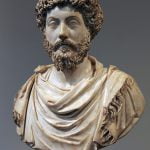“Germania” was written around 98 CE by the Roman historian Publius Cornelius Tacitus. It describes the history and situation of the Germanic tribes with whom Rome came into contact. “Germania” didn’t get much attention until the 15th century.
It was first noticed in 1425 when it was found in Hersfeld Abbey. The manuscript was transported to Rome and shown to the Pope. It was then that German humanists first noticed the text. Additionally, in 1902, the Codex Aesinas – a lost part of the Hersfeld Abbey manuscript was found at the estate of Aurelio Balleani in Italy.
There were statements in Germania that the Germanic tribes descended from “earthly gods” which caught the attention of Nazi ideologues at a time when the Nazis themselves were seizing power. They used these claims as evidence of their theses about the almost divine Aryans from whom Germany would descend. Their fascination with Tacitus’ work reached such a level that at the party congress in Nuremberg in 1936, the walls of the “Germanic” hall were decorated with quotes from Germania. The logical consequence of this interest attempted to obtain the manuscript.
Hitler raised this topic for the first time in a conversation with Mussolini during his visit to Berlin in 1936. Hitler then asked Mussolini to hand over the manuscript to Germany. Initially, Mussolini agreed to hand over the text but withdrew under pressure from the public, which refused to agree to donate part of Italy’s cultural heritage to anyone. Ultimately, thanks to the efforts of the German ambassador to Italy, Georg von Mackensen, the Italians agreed to allow Rudolf Till and Paul Lehmann to research the text. However, this was not enough for Himmler who was still looking for a way to obtain the manuscript.
The situation changed in the fall of 1943. On September 8 this year, Italy signed an agreement with the Allies and Mussolini was deposed. From that moment on, the Germans no longer needed to act diplomatically. Shortly after the ceasefire, a special SS unit was dispatched to Balleani’s estate in Jesi to obtain the manuscript. However, when the SS men broke down the door, silence greeted them. The Germans, with the help of local fascists, began to take the house apart from the inside, hoping to find the text. However, the Germans did not know that before their arrival Balleani had been warned by a fascist acquaintance about the imminent arrival of the Germans. Balleani and his family hid in an estate in Osimo, and the manuscript itself was transferred to the second estate in Jesi and hidden in a chest in the basement. This particular house seemed to be abandoned, so the SS did not expect to find anything there and searched it only briefly. After the war, Balleani deposited the manuscript.






